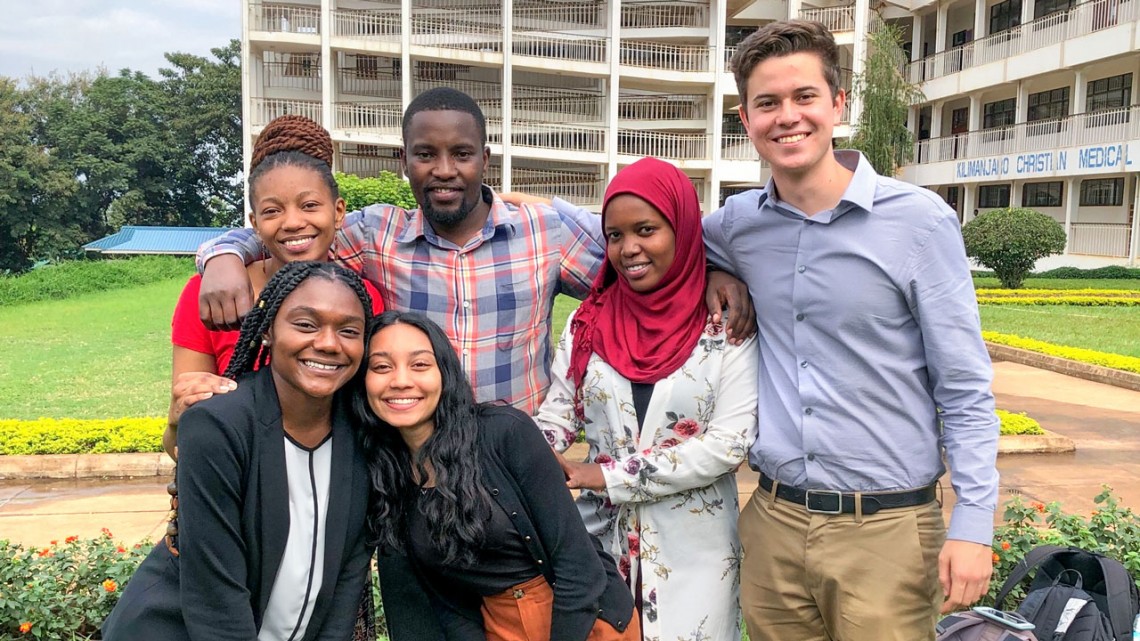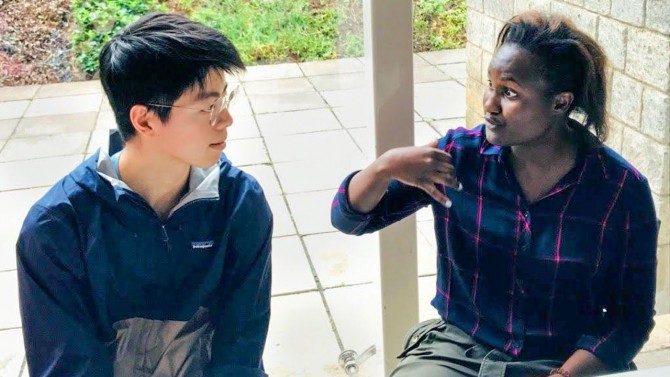
Aneri Patel ’21, front right, with her research group of Cornell and Kilimanjaro Christian Medical University College students during the summer 2019 Global Health Program in Tanzania.
Students reflect on engaged experiences, leadership
By Daniel Aloi
Twenty students recently completed a leadership program that gave them a chance to reflect and build on their community-engaged learning experiences.
The Certificate in Engaged Leadership program, administered by the Office of Engagement Initiatives (OEI), aims to foster change and build continuity in leadership with a public purpose among group participants, on campus and beyond.
Through a weekly series of interactive capstone dialogues this semester, meeting first at the Engaged Cornell Hub in Kennedy Hall and continuing online, two student cohorts shared transformational experiences in contributing to local and global communities for the public good. They discussed their commitments and models of change, what they learned, and their plans and goals for future engagement with communities.
“Students participate for a lot of different reasons, and some of the biggest are applying your talent in areas that you’re already involved in,” Sawako Suzuki ’20 said. “A lot of people do have an idea of what they want to do before coming into the program, and a lot of community engaged leadership is figuring out what that is, to move forward.”
Suzuki is an international agriculture and rural development major with a nutrition and health minor. As an Engaged Ambassador, she spreads the word on engagement opportunities at Cornell and the range of resources available to students, and she and her peers coordinate every aspect of the leadership program and facilitate capstone sessions.
She has volunteered since her freshman year with a student group partnered with national nonprofit organization Camp Kesem to provide a free week-long summer camp and year-round support and resources to Tompkins County children who have been impacted by a parent's cancer. She calls it “some of the most meaningful work I have done at Cornell.”
Engineering major Alex Li ’20 said he first “branched out” into community-engaged learning in his junior year. He worked on a digital agriculture project over winter break with M-Farm, an agritech company in Nairobi, Kenya, through the SMART program (Student Multidisciplinary Applied Research Teams).
“I wanted to see how engineering can be applied in development. It was cool to see Cornell learning applied in a tangible way,” said Li, who plans to work in tech and consulting in the San Francisco Bay Area before graduate school, and wants “to learn how people can effectively work together to solve issues of sustainability.”
Students enter the eight-week capstone – the final stage of the program – with a proven commitment, including 80 hours of engagement with one organization or project and participation in leadership education, critical reflection, retreats and workshops. As they progress through the program, they become eligible for increased funding for community-engaged learning projects and the opportunity to serve as an Engaged Ambassador.
Human biology, health and society major Aneri Patel ’21 has helped immigrants overcome educational barriers and earn GEDs, and will focus her engagement work next year on health and equity issues in the Ithaca community. Last summer, Patel and fellow cohort members Jasmine Peng ’20, a biological sciences major, and Bunmi Osias ’21, a global and public health sciences major, did engaged research with the Global Health Program in Tanzania.
Raksha Krishnan ’22, a neurobiology and behavior major minoring in global health and music, and serves as vice president of the Cornell Center for Health Equity. “I’m seeing how this opportunity could help me to widen outreach,” she said, “and help with bridging health disparities on our campus.”
Government major Penelope Campos ’20 is concerned with poverty in her native New York City, specifically educational inequality, immigrant rights and housing. She works with various nonprofits and family services programs.
“I realize these issues are all interconnected,” she said. “My vision of a healthy community is one where all people, especially those in public service, contribute to a safe and supportive environment, where opportunities reach those for whom they have not typically been accessible.”
The program’s framework for critical reflection, Suzuki said, “allows you to apply the experiences you’re having into new contexts … to remember what your purpose is coming into it, and how that’s impacted you throughout the process.”
“You are creating the blueprint for future action based on your personal story of self and how you envision living into your purpose,” Mike Bishop, director of student leadership in OEI, told students during a capstone session.
“Every capstone cohort is made up of the students I wanted to be when I was in college,” said Joy Shri Das, M.P.A. ’18, student leadership program manager in OEI. “This semester’s cohorts showed exceptional commitment in pursuing the dialogue sessions when campus dispersed. They proved to be incredibly brave in the vulnerability they showed during the discussions, which can be tricky when you are back with your family.”
The COVID-19 pandemic also “impacted their models of change,” Das said.
“For Keelin Kelly ’20 [who worked on climate change assistance with farmers in Armenia], her commitment to advocating for small farms like her family’s was reinforced,” Das said. “Matt Ponticiello ’21 [an Engaged Ambassador and global and public health sciences major], who has many different public issues he cares about, realized through his reflections and conversations with his peers why he is most committed to supporting immigrants building lives in the United States.”
Sarah Hazlitt, domestic logistics coordinator in OEI, also participated in the capstone dialogues.
“Her experience pushed her to build relationships and take on a leadership role at the Seneca Lake Pure Waters Association,” Das said. “She’s a perfect example of how the dialogue sets up all participants to pursue lifelong community-engaged learning.”
Media Contact
Get Cornell news delivered right to your inbox.
Subscribe


